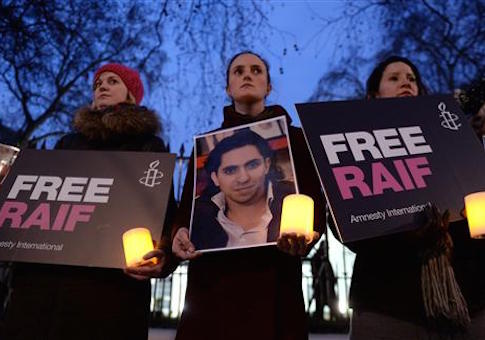A group of Jewish-American and Muslim leaders are petitioning the Saudi government to allow them to take 100 lashes each in place of an imprisoned Saudi blogger recently sentenced to a flogging for criticizing his country’s leadership.
Saudi blogger Raif Badawi was convicted of blasphemy and sentenced by the Saudi Arabian government to a 10-year prison sentence plus 1,000 lashes by whip for writing several articles critical of his country’s strict Islamic leadership.
Badawi has already received 50 lashes and is scheduled to receive another 50 once his wounds heal from the first beating, according to reports.
In a new bid to highlight Badawi’s plight, a group a seven U.S. activists—including a Princeton University professor and a leading American Muslim leader—have offered to receive up to 100 lashes each on the embattled blogger’s behalf, according to a letter they sent to Saudi Arabia’s ambassador to the United States.
"If your government will not remit the punishment of Raif Badawi, we respectfully ask that you permit each of us to take 100 of the lashes that would be given to him," they wrote, according to a copy of the letter. "We would rather share in his victimization than stand by and watch him being cruelly tortured. If your government does not see fit to stop this from happening, we are prepared to present ourselves to receive our share of Mr. Badawi’s unjust punishment."
Those offering to stand-in for Badawi include: Robert George, the McCormick professor of jurisprudence at Princeton University; Zhudi Jasser, the president of the American Islamic Forum for Democracy (AIFD); Hannah Rosenthal, the CEO of the Milwaukee Jewish Federation; and Katrina Lantos Swett, the president of the Lantos Foundation for Human Rights & Justice.
Two professors from Villanova University and the University of Minnesota also have signed the letter.
All of the activists are members of the U.S. Commission on International Religious Freedom, which advises the State Department and Congress, though each have proposed this offer as private citizens, they say.
Villanova University professor Daniel Mark told the Washington Free Beacon that the Saudi government has yet to respond to their request.
Mark said he hopes that President Obama will raise the issue during a scheduled meeting Tuesday with the newly installed Saudi monarch, King Salman.
"If the negative publicity doesn’t directly move the Saudi government to act, perhaps it will move President Obama or Secretary Kerry to act," Mark said in an interview. "Short of their intervention, we’re not going to see good results."
In their letter, the activists harshly criticize the Saudi government for ignoring "human rights and civil liberties."
"We note with sorrow that in the Kingdom itself Raif Badawi stands condemned under rules that flagrantly violate these human rights and civil liberties and is being subjected to an unspeakably cruel punishment of 1,000 lashes," they wrote.
"We call on the government of the Kingdom to put a halt to this grave injustice. We are informed that Mr. Badawi has already endured 50 lashes and will soon be made to endure 50 more," the letter says. "We are deeply alarmed by the prospect of his continued and grave suffering."
Mark went on to point out that Badawi is "being punished for nothing more than exercising his freedom of religion, his freedom of speech."
"It’s a good opportunity to remind everyone in the world how desperately vigilant we need to be about these sorts of things--the defense of freedom of religion and our other freedoms," he said.
Badawi’s plight also highlights the ineffectiveness of the U.S. government’s approach to "militant Islamicism," according to AIFD president M. Zuhdi Jasser.
"There is no moral difference between the Islamist terrorists in Paris who militantly invoked blasphemy laws against Charlie Hebdo and the Saudi royal regime and its clerical infrastructure," Jasser told the Free Beacon.
"For all those who say where are the voices of reform and anti-Islamism in the global Muslim community, well they are smothered and whipped by our so-called allies like the House of Saud who one barrel at a time radicalize the world’s Muslims, while claiming to have God-given ownership and custodianship of the Islam’s holiest mosques," Jasser said.
Saudi Arabia, which is undergoing a leadership transition following the death of King Abdullah, has often come under fire from human rights activists for its treatment of women and dedication to a strict version of Islamic law.
Many view the newly appointed monarch, King Salman, as a reformer who will maintain close relations with the United States, one of Saudi Arabia’s closest allies.
However, the Free Beacon reported on Monday that Salman has had close ties with several anti-Semitic Muslim clerics and has been accused of funding radical terror groups.
Asked on Monday if he would actually accept the 100 lashes, Mark said that he is committed to the cause.
"The answer is yes. I thought about it seriously when I signed the letter," he said. "If I’m going to sign this letter I have to at least to believe in my head that I’m really willing to do this. And that’s what I believe right now."
